
Got a question? We're happy to help
08719844416Cooker hoods are designed to clean up your kitchen environment by removing airborne grease, smoke and odour whilst you cook. They can either extract or recirculate air, each have their own benefits. Most of our hoods can do either, leaving the choice up to you.
Cooker hoods are designed to clean up your kitchen environment by removing airborne grease, smoke and odour whilst you cook. They can either extract or recirculate air, each have their own benefits. Most of our hoods can do either, leaving the choice up to you.
These hoods remove the grease, smoke and odour from the kitchen using ducting which leads to the outside of the home. They tend to be the most effective and fast option. When installing, they need to be mounted to an external wall and require a grease filter, which is usually included. You’ll need to get a professional to fit one, unless you’re replacing a hood and suitable extraction is already in place. View all Extracting Hoods »
These hoods clean the air with filters and then reintroduce it back in to the kitchen. They’re great if you’re unable to install ducting in your home. When installing, they can be placed on any wall in the kitchen and you can install them yourself. They require a grease filter which is usually included and a carbon filter to take care of any smoke and odour, this may need to be purchased separately. View all Recirculating Hoods »
Cooker hoods come with different extraction rates, which determine how quickly the air is changed in the kitchen. It’s recommended that your cooker hood should change the air around 10 times per hour. So, the larger the kitchen the higher the extraction rate.
There’s a fairly easy way to work out what extraction rate your kitchen will need.
Kitchens come in all different sizes and shapes, and so do our hoods. There are plenty of widths to choose from, starting from 25cm up to 120cm. You should aim for a cooker hood that is the same width as your hob, to get an efficient result. There’s nothing stopping you from going larger if you have the space. Popular cooker hood widths:
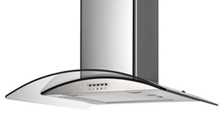
Chimney Hoods » Designed to be mounted to a wall.
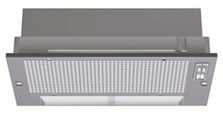
Canopy Hoods »Positioned directly under your kitchen cabinet.
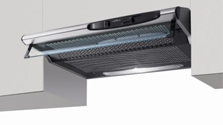
Visor Hoods »A low cost hood designed to be mounted to a wall.
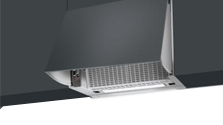
Integrated Hoods »Hidden behind a cabinet door & activated by opening the door.
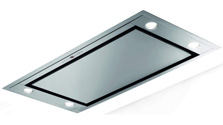
Ceiling Hoods »Installed to sit flush to your ceiling.
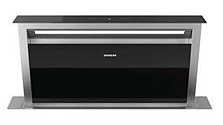
Downdraft Extractors »Designed to be discreetly hidden away in your worktop.
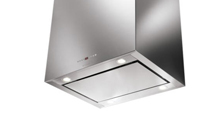
Island Hoods »To be positioned above a kitchen island.
There’s lots of different control types to choose from. Touch controls can give a premium look whilst also being easy to wipe clean. Whereas nothing is as easy and simple as push button controls. There’s also slider controls and LED displays, the choice is all yours.
All cooker hoods are given an energy efficiency rating from G up to A++. All our cooker hoods will let you know their energy efficiency rating on the product page. The average cooker hood has a D rating for energy efficiency.
Most hoods come with 2 or more lights. The lights illuminate your hob and the surrounding space, giving you clear visibility when cooking whilst also adding a stylish touch to your room. You’ll see a choice of LED, halogen or incandescent lights. LED lights tend to be brighter and more energy efficient.
No cooker hood's are silent, but some are louder than others. Look out for the decibel rating, this will give you an idea of how loud it is. Most hoods are around 60dB which is the noise level of a normal conversation.
Some cooker hoods include a remote control, which makes switching through the settings quick and easy from anywhere in the kitchen. They also come in ideal if you find it hard to reach the manual settings on the hood.
Once you’ve decided on the type of cooker hood you’re after you’ll need to think about style. Whether you’re after a simple and classic look in stainless steel or a contemporary designer look with touch controls, there’s plenty to choose from.
The cooker hood needs to be positioned directly above your hob with an electricity supply nearby. If you’re planning to extract air rather than recirculating it, it’ll need to be placed on an exterior wall.
When fitting a cooker hood above an electric hob you should have a minimum gap of 65cm. And for a gas hob the minimum gap between the two should be 75cm. Your cooker hood manual will have more information on this.
The extraction rate your kitchen needs all depends on its size. The faster the extraction rate the faster the air will be cleaned, although the noise level may go up, so faster isn’t always better. Take a look at how to work out your extraction rate above.
Whether you’re extracting or recirculating air, both need a grease filter. This traps any grease particles in the air. You’ll only need a carbon filter if you’re recirculating air, as this will remove any smoke and odour, so the air that is recirculated back in to the room is nice and clean.
If the surface is greasy, use a clean cloth, warm water and washing up liquid. It’s best to clean in the direction of the polish lines. Rinse with clear water and wipe dry. For regular cleaning a good method is to use a microfiber cloth and water. Never use solvents or aggressive cleaners as you could damage the finish.
These are removable and can generally be placed in the dishwasher. Check your user manual first though. Alternatively they can be cleaned in warm soapy water.
You should aim to clean the grease filters once a month, depending on the amount of usage. The more grease you generate when cooking the more often you’ll need to clean them. Frying and cooking with a wok tend to generate more grease.
This depends on how much you use your cooker hood. Generally you should look to replace grease filters once a year.
It’s common to replace carbon filters every six month. However this depends on how regularly the cooker hood is used and the types of food you’re cooking. Check your user manual for more details.
Each cooker hood is different, so it’s best to check your user manual as to how you change the light bulbs. Your manual will also let you know what type of bulb to use. Remember to switch off the power supply!
